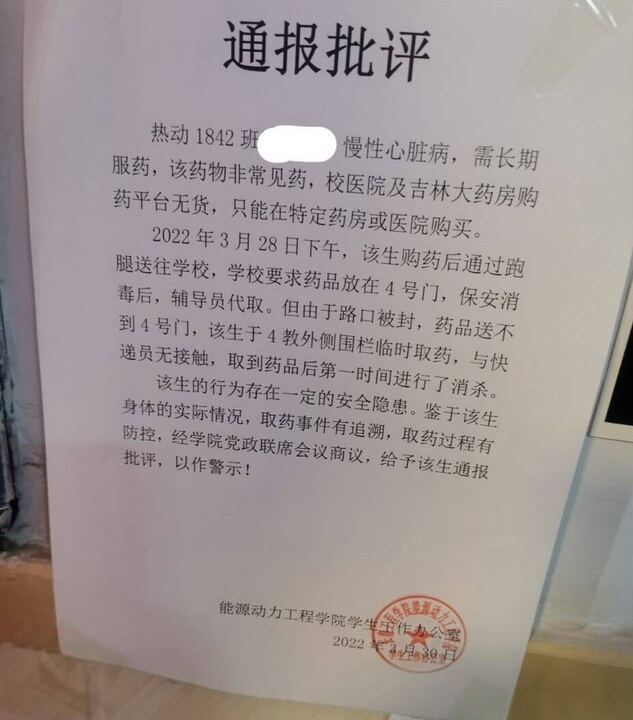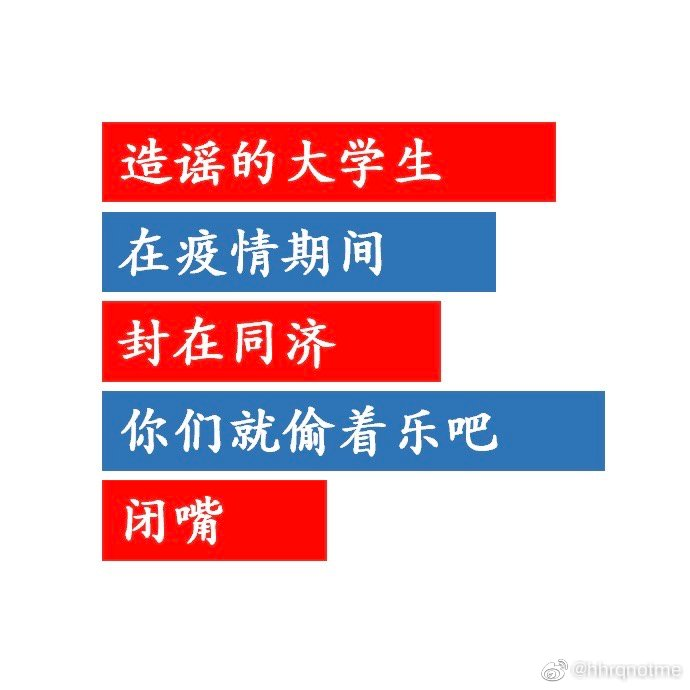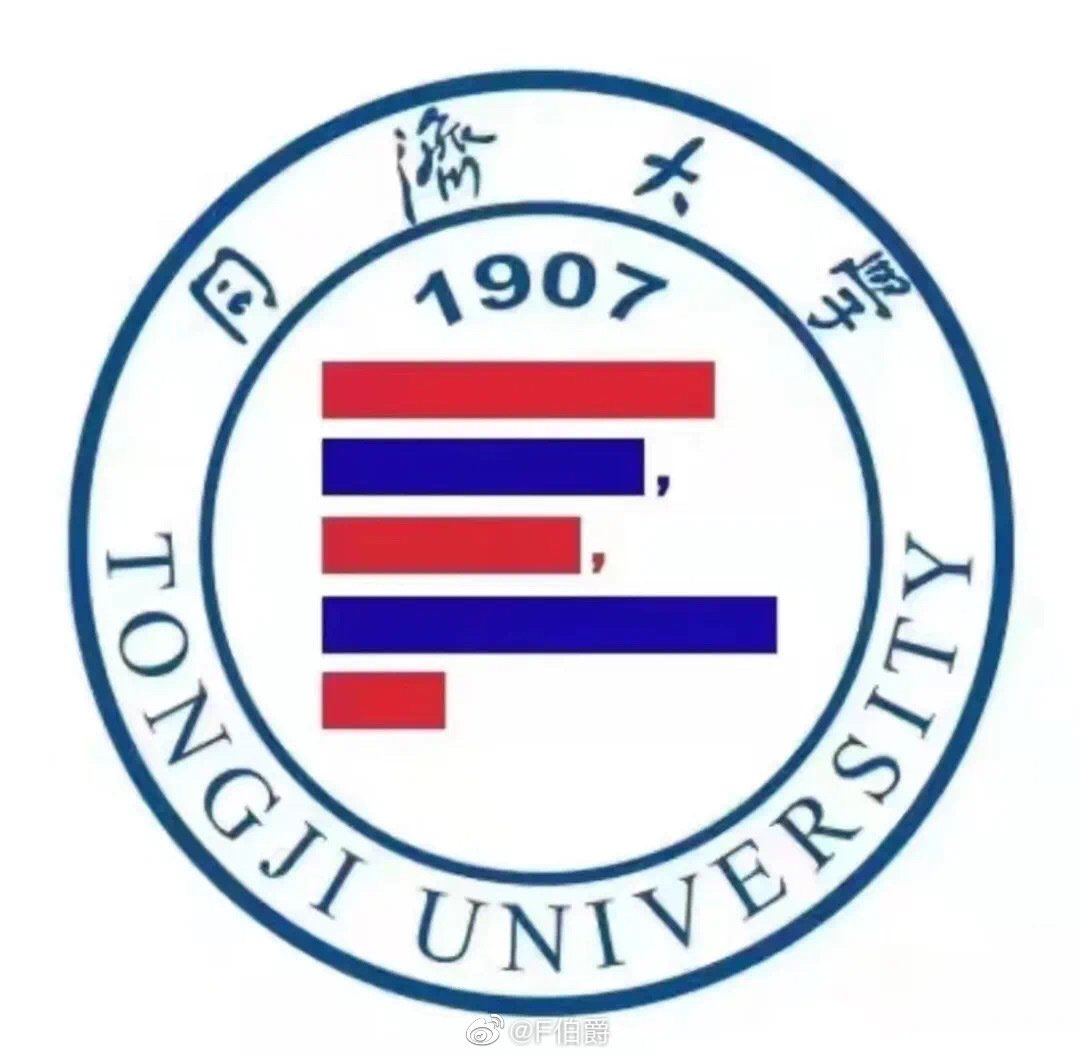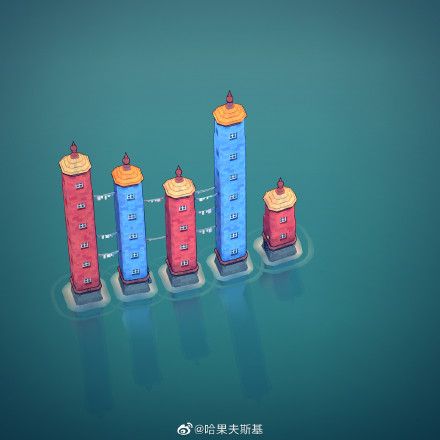The past weekend has brought more bad news for many Chinese students who have found themselves at the whim of the government’s aggressive and sustained zero-COVID policies. On Saturday, Shanghai officials announced that the city’s university and high school entrance exams (known as gaokao and zhongkao, respectively) would be postponed by a month to early July, affecting more than 50,000 high school seniors and 110,000 middle schoolers. All schools in Shanghai switched to remote learning in mid-March, with university campuses and some vocational schools placed under lockdown. Meanwhile, Beijing has also begun closing schools since late April, with no definite plan to resume.
Students who follow international curricula in China are also being affected. On Friday, thousands of high school students preparing to study abroad were informed that they would no longer be able to take Advanced Placement exams this year. The College Board, which administers AP tests once a year, had canceled the exams in eight Chinese cities and offered no makeup or online option, citing ongoing COVID disruptions in China. Other international tests, including the International Baccalaureate and A levels, have also been canceled in some cities. Many students believe the missing scores will weaken their college applications.
For over two months, university students in many cities have been ordered to stay on campus, or even in their dorm rooms. Students at Shanghai’s prestigious Fudan University were ordered to quarantine on campus on March 13, with no end date given. Most students were confined to their dorm rooms except for during trips to the bathroom, shower breaks, or timed slots for exercise. Dozens of students suffered from diarrhea after consuming meals prepared by the school cafeteria, as documented by Zhi Ye, a former journalist and Fudan graduate, in a now-deleted essay posted to her WeChat blog. Students at Shanghai’s Tongji University were reportedly given timed bathroom breaks; some also allegedly suffered from food poisoning.
Students in Jilin, a province in Northeast China and the epicenter of another recent Omicron outbreak, have been locked down on campus for even longer. On social media, students from various cities and towns in Jilin have vented frustration over what they view as draconian COVID measures. Some reportedly had to go through a “lottery” system for shower slots. Many of the posts have been deleted and CDT is unable to independently verify the claims. In a now-deleted post archived by CDT Chinese, WeChat blog 运气夹心谈 documented the lives of university students in Changchun, the capital city of Jilin:
Every evening after dinner, Yuan Li, a student at Jilin Province Economic Management Cadre College, logs on to WeChat to reserve a slot for a restroom break, even if she doesn’t need to go urgently. “519 waiting, 517 waiting, 513 gone, 513 returned, 523 no longer going ….” The numbers in these messages refer to individual dorms. Students may only use the restroom one at a time. Per school regulations, no more than one person is allowed in the corridor at any given time. After waiting for one hour and 30 minutes, Yuan is on her way to the restroom. She can’t help but ask herself: “Since when did something as mundane [as using the toilet] feel like a blessing?”
[…] Few dorm buildings in Northeast China are equipped with shower facilities. Students use the public shower rooms on campus instead. Since the lockdown was imposed more than a month ago, university students in Changchun have not had the opportunity to shower. Some have had to take improvised showers by pouring basins of water over themselves in the squat toilet facilities of their dorm building.
On the 30th day of quarantine, Jilin University student Lin Xiang received good news: it was his turn to shower, along with everyone else in his dorm building. Students were divided into 18 groups of around 40 people each. They lined up in the corridor from 7:00 am to 10:30 pm under the supervision of volunteers, who ensured that students stood at least two meters apart with masks on—masks can be taken off only when students enter the shower room.
Before taking a shower, students are required to scan a QR code for contact-tracing and have their temperature checked. Jilin University has launched its own contact-tracing app that tracks which school buildings students visit. [Chinese]
In some instances, aggressive COVID measures have left students in quarantine unable to receive necessary medications. In late March, a student in Changchun was “admonished” by their school for violating COVID measures after they ordered heart disease medication through a delivery service:
Notice of Admonishment:
XXX [student’s name redacted] of Thermodynamics Studies Cohort 1842 has chronic heart disease and requires long-term medication, which is not widely available. The medication was out of stock at both the campus clinic and Jilin Pharmacy, and thus could only be purchased from a special pharmacy or hospital.
On the afternoon of March 28, 2022, the aforementioned student ordered the medication to be delivered to the school. Per school regulations, the medication should have been delivered to Gate 4 and disinfected by a security guard, before being picked up by a counselor on behalf of the student. However, because of road closures, the courier was unable to deliver the medication to Gate 4. The student then picked up the medication through the fence outside Classroom Building 4. The student had no contact with the delivery worker and carried out disinfection measures immediately afterwards.
The student’s action carried a certain level of risk. Taking into consideration the reality of the student’s health condition, the fact that the incident was traceable, and that precautions were taken throughout the process, the Joint Conference of the School Administration and the Party Committee has decided to publicly admonish the student as a warning!
Student Affairs Office, College of Energy and Power Engineering
March 30, 2022 [Chinese]

Notice of Admonishment, embossed with the university’s official red stamp
Also circulating on WeChat is a long essay by T中文版, a Chinese publication affiliated with the New York Times Style Magazine, that documented how ten Chinese students in different schools coped with lockdowns. Wang Siyi, a master’s student in Changchun, said that he had been unable to get allergy medications:
“I fell ill [during the lockdown]. I have a sensitive constitution and am prone to allergies. I used to get medication delivered to me every two days. But after the quarantine measures were tightened, that was no longer possible, so all I could do was try to stick it out.” [Chinese]
Students outside COVID epicenters are not necessarily having an easier time. In one instance, Shandong University transferred more than ten thousand students and staff members to quarantine in four different cities following detection of a single asymptomatic case on campus.
Prolonged lockdowns and harsh measures have sparked protests on many campuses across China. On April 26, a student at Tongji University in Shanghai cursed the school administration during a virtual town hall. According to now-deleted social media posts archived by CDT Chinese, school administrators muted the microphones of student participants and ignored their questions in the chat-box. One frustrated student then shared his screen with the following angry message in red and blue characters:
“Stop reading from your f***ing script. Why won’t you unmute me? You bastard.” [Chinese]
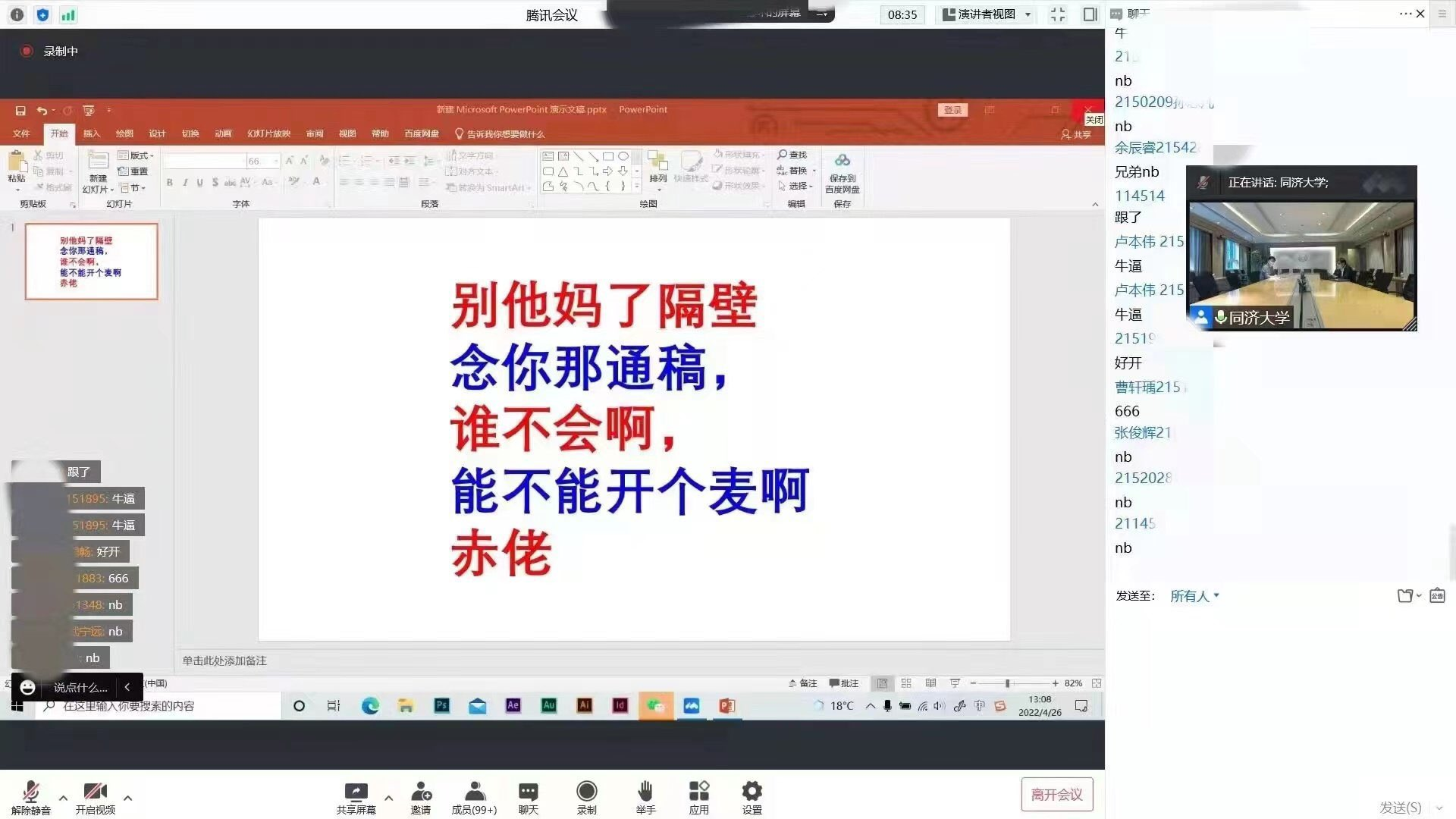
The original screenshot of the Tongji University student’s angry message, in blue and red text.
Screenshots suggest that the student’s action was praised by other student participants at the virtual conference, inspiring a wave of memes that mimicked the aesthetic of his screenshot. For instance, the meme in the screenshot below apparently built upon earlier remarks by Chinese diplomat Zhao Lijian, who said that expats should feel “lucky” to live in China during the pandemic:
You rumor-mongering students
locked in Tongji U.
during the pandemic
ought to feel lucky
so STFU [Chinese]
Another post showed the Tongji University emblem “redacted” with blue and red stripes:
The memes became increasingly abstract, in an effort to evade censorship:
These and other memes inspired by the Tongji student have been archived by CDT Chinese.
Other campuses across different cities have seen student activism against stringent COVID rules. Sichuan University students put up banners in March in an attempt to organize school strikes after posts circulating online suggested that the school was selectively exempting some faculty members and their families from lockdown measures. In the same month, Sun Jian, a student at Ludong University in Shandong, was expelled after demanding an end to the lockdown at his school. In early May, students at Nankai University in Tianjin, the alma mater of China’s first premier Zhou Enlai, printed Zhou’s words on two banners and draped them from a school building to protest prolonged quarantine:

Banners at Tianjin’s Nankai University with a quote from Zhou En’lai: “But seeing the steps that Nankai is taking, I can’t help but conclude that it is heading to its own grave.”
Like many other universities in China, most students at Nankai University have been prohibited from leaving campus since early March.
On that theme, now-deleted posts on multiple social media platforms show banners at Wuhan University of Science and Technology from late March:

Banners at Wuhan University of Science and Technology.
Top: End lockdown, give me my youth back!
Right: Since I’m here at WUST, I’d like to see Wuhan.
Left: Locking down campus but only locking in students is insane.
Another banner appeared on the campus of Nanjing University of Aeronautics and Astronautics in early April:

Banner at Nanjing University of Aeronautics and Astronautics: “We want food deliveries. We want to leave campus. We want freedom.”
In most cases, it remains unclear whether the student protesters were ever identified or punished.
On Tuesday, China reported a total of 324 new symptomatic cases of COVID-19.




